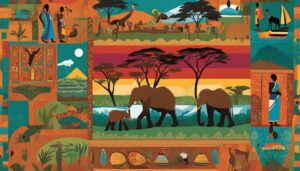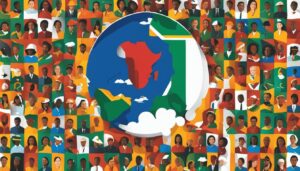Nigeria’s linguistic landscape is rich and diverse, with over 525 native languages spoken throughout the country. However, the official language and widely spoken lingua franca is English. Nigerian Pidgin, an English-based creole, is also spoken by 30 million people in Nigeria. The major native languages in terms of population are Hausa, Yoruba, Igbo, and Efik-Ibibio. Nigeria’s linguistic diversity represents the three major African language families: Afroasiatic, Nilo-Saharan, and Niger-Congo. English remains the official language and is widely used in government, business, and education. Nigerian Pidgin has also gained popularity and is used in the media and politics. Afroasiatic languages, such as Hausa, and Niger-Congo languages, like Igbo and Yoruba, are commonly spoken in different regions of Nigeria. The geographic distribution of Niger-Congo languages extends beyond middle eastern and south-central Nigeria.
Key Takeaways:
- Nigeria is home to over 525 native languages.
- The official language of Nigeria is English.
- Nigerian Pidgin, an English-based creole, is widely spoken.
- The major native languages in Nigeria are Hausa, Yoruba, Igbo, and Efik-Ibibio.
- Nigeria’s linguistic diversity represents the Afroasiatic, Nilo-Saharan, and Niger-Congo language families.
Official Language and Nigerian Pidgin
The official language of Nigeria is English, serving as the lingua franca for communication across different ethnic groups. Additionally, Nigerian Pidgin, an English-based creole, is spoken by around 30 million people in Nigeria.
English, inherited from British colonial rule, holds significant importance in Nigeria. It is used in government, business, education, and the legal system. As the language of instruction in schools, proficiency in English is sought after, providing access to better opportunities in the country.
While English is widely understood, Nigerian Pidgin has gained popularity and become a distinct form of communication. It is a vibrant and colorful blend of English and local languages, enriched with slang, cultural references, and unique expressions.
Nigerian Pidgin has successfully carved its niche in media and entertainment, including music, movies, and comedy. Its charm lies in its ability to connect people across cultural and linguistic boundaries, fostering a sense of unity and identity among Nigerians.
| Official Language | Nigerian Pidgin |
|---|---|
| English | English-based creole |
| Serves as the lingua franca in Nigeria | Spoken by around 30 million people |
| Used in government, business, and education | Vibrant form of communication with cultural references |
| Language of instruction in schools | Popularity in media, music, movies, and comedy |
Major Native Languages
Among the diverse native languages spoken in Nigeria, the major ones in terms of population are Hausa, Yoruba, Igbo, and Efik-Ibibio. These languages have a significant presence in different regions of the country and contribute to the rich linguistic tapestry of Nigeria.
Hausa is predominantly spoken in northern Nigeria and is the most widely spoken native language in the country. It is also considered a lingua franca in several neighboring countries. Yoruba, on the other hand, is primarily spoken in southwestern Nigeria and parts of neighboring countries. It is known for its tonal nature and has a large number of speakers.
Igbo is mainly spoken in southeastern Nigeria and is one of the largest Nigerian languages, both in terms of population and geographic distribution. It is characterized by its complex grammatical structure and rich cultural heritage. Lastly, Efik-Ibibio is spoken in the Cross River region of Nigeria and is known for its unique tonal system.
| Language | Region | Number of Speakers |
|---|---|---|
| Hausa | North | Over 50 million |
| Yoruba | Southwest | Over 30 million |
| Igbo | Southeast | Over 20 million |
| Efik-Ibibio | Cross River | Over 5 million |
These major native languages play an essential role in the cultural identity and communication among Nigerians. They are used in various domains, including literature, music, film, and traditional ceremonies.
Linguistic Diversity and Language Families
Nigeria’s linguistic diversity reflects the presence of three major African language families: Afroasiatic, Nilo-Saharan, and Niger-Congo. Among these, the Niger-Congo family is the most widely spread across the country, extending beyond the middle eastern and south-central regions. This rich linguistic tapestry comprises over 525 indigenous languages, each with its unique cultural and historical significance.
The Afroasiatic languages, notably Hausa, are predominantly spoken in northern Nigeria. With an estimated 63 million speakers, Hausa is one of the most widely spoken languages in Africa. It serves as a lingua franca in the region, connecting people from diverse ethnic backgrounds. In addition to Hausa, other Afroasiatic languages found in Nigeria include Berber, Chadic, and Cushitic.
On the other hand, the Niger-Congo language family encompasses several language groups, including the Benue-Congo, Atlantic-Congo, and Kwa languages. The Benue-Congo group includes the major languages of Yoruba, Igbo, and Efik-Ibibio. Yoruba, with over 20 million speakers, is mainly spoken in southwestern Nigeria. Igbo, spoken by approximately 18 million people, is primarily found in the southeastern region. Efik-Ibibio, spoken by the Efik, Ibibio, and Annang ethnic groups, is prominent in the Cross River area.
| Language Family | Major Languages | Approximate Number of Speakers |
|---|---|---|
| Afroasiatic | Hausa, Berber, Chadic, Cushitic | 63 million (Hausa) |
| Niger-Congo | Yoruba, Igbo, Efik-Ibibio | 20 million (Yoruba), 18 million (Igbo) |
The linguistic landscape of Nigeria also includes languages from the Nilo-Saharan family, although they are less predominant compared to Afroasiatic and Niger-Congo languages. These languages are mainly spoken by ethnic groups residing in northeastern Nigeria. Additionally, English, as the official language, plays a vital role in government, business, education, and interethnic communication.
This remarkable linguistic diversity not only reflects Nigeria’s cultural heritage but also serves as a testament to the country’s vibrant tapestry of traditions, histories, and identities.
Language Usage in Nigeria
English serves as the official language of Nigeria and is widely used in government, business, and education. It is the language of instruction in schools and universities, and proficiency in English is seen as essential for success in these sectors. The language is also used in legal proceedings, official documents, and international communication. With Nigeria being a former British colony, the influence of the English language is deeply rooted in the country’s history and culture.
In addition to English, Nigerian Pidgin has gained popularity, particularly in the media and political spheres. Nigerian Pidgin is an English-based creole that developed as a lingua franca among different ethnic groups in Nigeria. It is characterized by a blend of English vocabulary, grammatical structures, and local Nigerian languages. Nigerian Pidgin has become a dynamic and expressive form of communication, widely used in music, radio, movies, and informal social settings.
The linguistic landscape of Nigeria is further enriched by the diverse range of native languages spoken across the country. The major native languages include Hausa, Yoruba, Igbo, and Efik-Ibibio, which have significant populations of speakers. These languages are predominantly spoken in different regions of Nigeria and reflect the cultural diversity of the country’s various ethnic groups. They play a crucial role in maintaining cultural identity and are actively used in daily interactions, family settings, and community events.
It’s important to note that while English and Nigerian Pidgin have gained widespread usage, the native languages of Nigeria are still prevalent and valued. They hold immense cultural and historical significance, representing the rich tapestry of the Nigerian people. The linguistic diversity of Nigeria, with over 525 native languages, is a testament to the country’s vibrant multicultural heritage.
| Language | Number of Speakers | Regions |
|---|---|---|
| Hausa | Over 40 million | Northern Nigeria |
| Yoruba | Over 20 million | Southwestern Nigeria |
| Igbo | Over 20 million | Southeastern Nigeria |
| Efik-Ibibio | Over 4 million | Southern Nigeria |
Conclusion
Nigeria’s linguistic landscape showcases a vast array of native languages, with English serving as the official language while Nigerian Pidgin and indigenous languages contribute to the country’s linguistic tapestry. With over 525 native languages spoken, Nigeria is a true hub of linguistic diversity. The official language, English, is not only widely spoken but also used in government, business, and education.
Nigerian Pidgin, an English-based creole, adds another layer to the linguistic fabric of the country, with approximately 30 million speakers. This unique blend of English and local expressions has gained popularity in media and politics, reflecting its influence and acceptance in Nigerian society.
Among the major native languages in Nigeria, Hausa, Yoruba, Igbo, and Efik-Ibibio stand out in terms of population and regional distribution. These languages, belonging to the Afroasiatic and Niger-Congo language families, are widely spoken in different parts of the country, adding to the rich cultural heritage.
Exploring Nigeria’s linguistic diversity reveals the presence of three major African language families: Afroasiatic, Nilo-Saharan, and Niger-Congo. The Niger-Congo language family, in particular, extends beyond the middle eastern and south-central regions of the country, showcasing its widespread influence.
FAQ
What language is spoken in Nigeria?
The official language in Nigeria is English, which is widely spoken and used in government, business, and education. However, there are also over 525 native languages spoken in the country.
What is Nigerian Pidgin?
Nigerian Pidgin is an English-based creole language spoken by 30 million people in Nigeria. It has gained popularity and is commonly used in the media and politics.
What are the major native languages in Nigeria?
The major native languages in Nigeria are Hausa, Yoruba, Igbo, and Efik-Ibibio. These languages are significant in terms of population and are commonly spoken in different regions of the country.
What language families are represented in Nigeria?
Nigeria’s linguistic diversity represents the three major African language families: Afroasiatic, Nilo-Saharan, and Niger-Congo. The geographic distribution of Niger-Congo languages extends beyond middle eastern and south-central Nigeria.
How are languages used in Nigeria?
English is the official language of Nigeria and is widely used in government, business, and education. Nigerian Pidgin, as well as native languages like Hausa, Yoruba, and Igbo, are also commonly spoken in different contexts, such as media, politics, and everyday communication.



